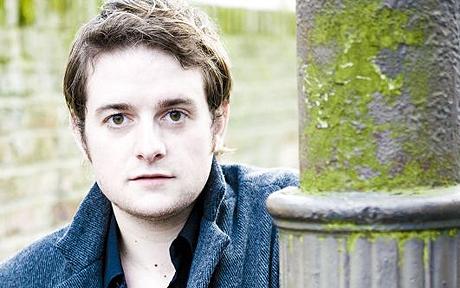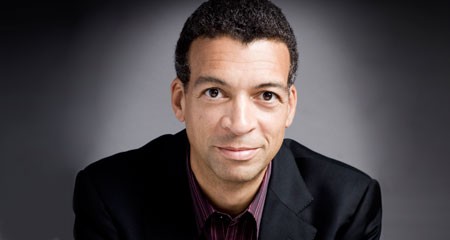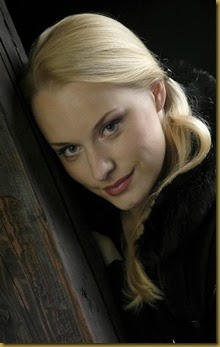How many reviews of War Requiem do you want to read in Britten centenary year? This is theartsdesk’s fourth, and my second – simply because though I reckon one live performance every five years is enough, Rattle’s much-anticipated Berlin Philharmonic interpretation fell almost entirely flat, and I wanted to hear at least one good enough to move me to tears.
Last night’s under the special circumstances of Remembrance Sunday wasn’t just good; it hit the heights and plumbed the depths, with no weak link in any of the soloists, choirs, orchestra or instrumental soloists. So much so that the tears threatened to become sobs, and self-restraint made just listening hard work.
The conductor was always going to be a risk. Semyon Bychkov has given us some of the most keenly articulated, sonically stunning performances I’ve heard from the BBC Symphony Orchestra – the players, certainly, won’t forget the Shostakovich Eleventh Symphony they gave with him at the Proms a couple of years back – but also the most leaden (a turgid, unspringy Walton First). Here, from the first uneasy string phrases, there was a master’s shaping hand at work. It floated the calmer moments, the ladies’ Recordare in the middle of the harrowing Dies Irae sequence and a Benedictus which swayed and trod air like no other I’ve heard, the composer’s own superlative interpretation on CD included.
 Yet Bychkov was also taut and ruthless in the many acid attacks. In these the massed BBC Symphony and Crouch End Festival Choruses had been magnificently drilled to move from accented whispers to mighty roars. And there’s nothing like hearing such forces singing perfect pianissimos in the cadence which finally resolves Britten’s ubiquitous symbol of unrest, the "devil in music" augmented fourth, at the end of three crucial sequences (indeed, the professional Berlin Radio Choir had been nowhere near as effective). The Choristers of Westminster Abbey could afford to sound brightly, almost cheekily oblivious to human suffering from their silhouetted positions up in the gallery – one very good reason why this masterpiece works best in Albert’s colosseum.
Yet Bychkov was also taut and ruthless in the many acid attacks. In these the massed BBC Symphony and Crouch End Festival Choruses had been magnificently drilled to move from accented whispers to mighty roars. And there’s nothing like hearing such forces singing perfect pianissimos in the cadence which finally resolves Britten’s ubiquitous symbol of unrest, the "devil in music" augmented fourth, at the end of three crucial sequences (indeed, the professional Berlin Radio Choir had been nowhere near as effective). The Choristers of Westminster Abbey could afford to sound brightly, almost cheekily oblivious to human suffering from their silhouetted positions up in the gallery – one very good reason why this masterpiece works best in Albert’s colosseum.
No doubt the advertised Andrew Kennedy would have been excellent in the Peter Pears share of the Wilfred Owen settings with chamber orchestra, but given his indisposition, the performance struck a rock-solid gold in Allan Clayton (pictured above). Bold in pitilessness, melting in the core moments such as “Was it for this the clay grew tall” and the 11-tone ascent of “Dona nobis pacem”, Clayton was the complete interpreter.
 So, in approach, was that baritone of supremely sympathetic demeanour Roderick Williams (pictured left). The very last degree of stentorian upper-register strength may have been lacking in the curse of the “great gun towering toward heaven” and the stress began to tell towards the very end, but the manner and the tender loving care of the text always carried it. And in daring to sing as softly as this receptive hall can take, Williams shared the burden with Clayton of “Strange Meeting”, Owen’s greatest poem and Britten’s most daringly spare setting, one that can never work at anything but the most consummate level - and that was achieved here.
So, in approach, was that baritone of supremely sympathetic demeanour Roderick Williams (pictured left). The very last degree of stentorian upper-register strength may have been lacking in the curse of the “great gun towering toward heaven” and the stress began to tell towards the very end, but the manner and the tender loving care of the text always carried it. And in daring to sing as softly as this receptive hall can take, Williams shared the burden with Clayton of “Strange Meeting”, Owen’s greatest poem and Britten’s most daringly spare setting, one that can never work at anything but the most consummate level - and that was achieved here.
 Consummate, too, was soprano Sabina Cvilak (pictured right), angel of the apocalypse from the organ above the orchestra, marrying the stentorian assurance of the part’s creator, Galina Vishnevskaya, with lyric warmth. Among the instrumentalists, the orchestral trumpets didn’t quite bite from where I was sitting near the front of what the Prommers know as the Arena, but all else was deeply eloquent, down to the slightest fleck of Sioned Williams’s harp-playing in the chamber ensemble. With all artists so fine-tuned to the work’s expressive possibilities, it wasn't difficult to share Shostakovich’s opinion that War Requiem shares equal honours with Mahler’s Das Lied von der Erde as the 20th century’s most profound musical utterance.
Consummate, too, was soprano Sabina Cvilak (pictured right), angel of the apocalypse from the organ above the orchestra, marrying the stentorian assurance of the part’s creator, Galina Vishnevskaya, with lyric warmth. Among the instrumentalists, the orchestral trumpets didn’t quite bite from where I was sitting near the front of what the Prommers know as the Arena, but all else was deeply eloquent, down to the slightest fleck of Sioned Williams’s harp-playing in the chamber ensemble. With all artists so fine-tuned to the work’s expressive possibilities, it wasn't difficult to share Shostakovich’s opinion that War Requiem shares equal honours with Mahler’s Das Lied von der Erde as the 20th century’s most profound musical utterance.












Add comment